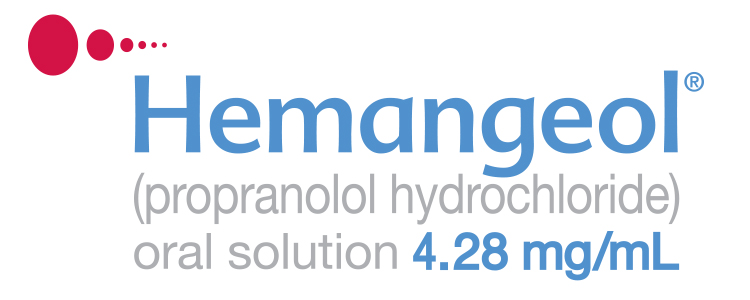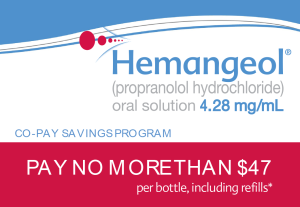Pay no more than $47
*Coupon offer may not be used with Medicare Part D, Medicaid, Va/DoD, Tricare or other federal or state health care programs. Please see program conditions and eligibility criteria to apply.
Important Safety Information for HEMANGEOL
Do not give HEMANGEOL to your child if your child:
- was born prematurely and has not reached the corrected age of 5 weeks
- weighs less than 4 ½ pounds
- is allergic to propranolol or any of the other ingredients in HEMANGEOL
- has asthma or a history of breathing problems
- has a heart problem, slow heart rate (less than 80 heart beats per minute), very low blood pressure
- is at risk for low blood sugar, for example is vomiting or unable to take feedings
- has high blood pressure caused by a tumor on the adrenal gland, called “pheochromocytoma”
Tell the doctor about all medicines your child is taking, or all the medicines you are taking if you are breastfeeding.
HEMANGEOL can cause serious side effects, including:
Low blood sugar (hypoglycemia), especially if your child is not taking feedings, or is vomiting. HEMANGEOL may make it more difficult to recognize the signs and symptoms of low blood sugar in your child. To help reduce the risk of low blood sugar with HEMANGEOL, give HEMANGEOL during or shortly after feeding your child. Feed your child regulary during treatment. Tell your doctor if your child has a poor appetite. If your child is not taking feedings, due to an illness or vomiting, do not give HEMANGEOL until your child is taking feedings normally again.
If your child has any of the signs or symptoms of low blood sugar listed below during treatment with HEMANGEOL, stop giving your child HEMANGEOL and call your doctor or go to the nearest emergency room right away.
Signs or symptoms of low blood sugar include: pale, blue or purple skin color, sweating, irritability, crying for no apparent reason, irregular or fast heartbeat, poor feeding, low body temperature, unusual sleepiness, seizures, breathing stops for short periods of time, and loss of consciousness
Other serious side effects can include:
- New or worsening slow heart rate (bradycardia) or low blood pressure (hypotension).
- Breathing problems or wheezing.
- Stroke. HEMANGEOL may increase the risk of stroke in certain children who have severe problems with the blood vessels in their brain, particularly if your child has a large hemangioma that affects the face or head.
- pale skin color, slow or uneven heartbeats, arms or legs feel cold, blue or purple skin color, or fainting.
- breathing problems or wheezing during treatment with HEMANGEOL.



